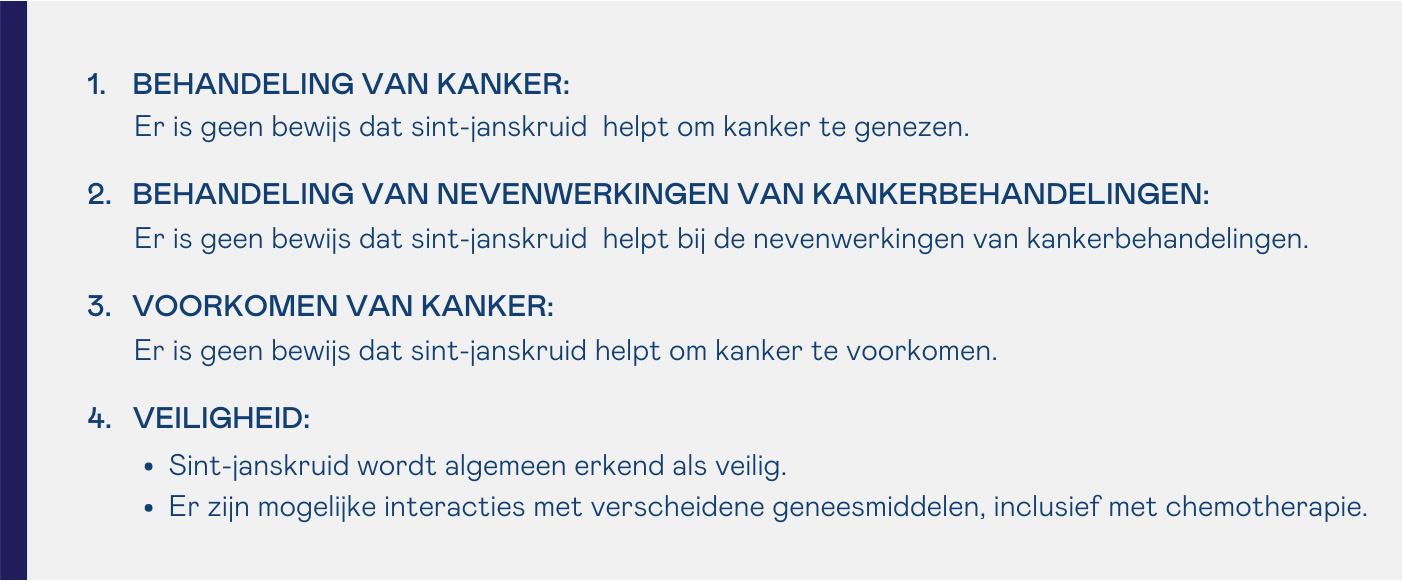

Sint-janskruid (hypericum perforatum) is een plant uit de hertshooifamilie van Europese oorsprong.
Sint-janskruid is een van de meest bestudeerde kruiden, met actieve bestanddelen hyperforine en hypericine als de focus van de meeste onderzoeken (2, 3).
Sint-janskruid is een kruid dat sinds eeuwen als natuurlijk medicijn wordt gebruikt.
Over de toepassing van sint-janskruid bij kanker(behandelingen) zijn er niet veel studies.
Tot op heden zijn er geen goed opgezette studies die de toepassing van sint-janskruid bij de behandeling van kanker nagaan. Kleine pilootstudies toonden een positief effect aan van een zalf met sint-janskruid tijdens de behandeling van huidkanker (7) en glioma (hersentumor) (8) op tumorgrootte. Dit soort onderzoek vraagt om verdere bevestiging.
Tot op heden zijn er geen goed opgezette studies die de toepassing van sint-janskruid bij de behandeling van nevenwerkingen van kankerbehandelingen nagaan. Een kleine pilootstudie toonde een positief effect aan van een zalf met sint-janskruid bij de behandeling van huidontstekingen na radiotherapie (9). Tevens werd het onderzocht voor de behandeling van nevenwerkingen bij borstkankerbehandeling met mogelijk gunstige effecten (10, 11).
Dit soort onderzoek vraagt om verdere bevestiging.
Er zijn niet veel studies over Sint-janskruid en het voorkomen van kanker. Een systematische literatuurstudie vond geen bewijzen voor het gebruik van sint-janskruid om borstkanker bij vrouwen in de menopauze te voorkomen (10, 11).
Sint-janskruid wordt algemeen erkend als veilig en geeft meestal weinig nevenwerkingen, uitgezonderd zeldzame ernstige nevenwerkingen.
Volgende nevenwerkingen komen frequenter voor:
Sint-janskruid wordt afgeraden bij:
Voedingssupplementen met sint-janskruid kunnen de doeltreffendheid van chemotherapie en pijnstillers beperken (12-19).
Als je sint-janskruid inneemt in combinatie met klassieke antidepressiva, kan dat leiden tot het zogenaamde serotoninesyndroom (1, 20).
Kenmerken van dat syndroom zijn:
Sint-janskruid kan de werking van bepaalde geneesmiddelen die gebruikt worden bij een operatie beïnvloeden. Het gebruik van sint-janskruid wordt afgeraden minstens twee weken vóór de operatie (21, 22).
Verdere interacties zijn beschreven met: